Today is the Apodosis, or leavetaking, of the greatest of Christian feasts, Pascha, the Bright Resurrection of Christ. We have gathered together some questions readers have asked about Pascha, and answers to them by Archimandrite Job (Gumerov), an ecclesiastical scholar and longtime monk of Sretensky Monastery.
Question: Batiushka, tell me how I can explain to a Muslim where the holy Old Testament prophets and righteous ones abode before the Resurrection of Christ—in paradise or in hades?
Answer: All Old Testament people, both righteous and sinful, before the redeeming sacrifice of Savior and His descent into hell (during his death on the Cross) were in Sheol (the underworld). The podvig of Jesus Christ, Who took upon himself all of people’s sins, destroyed the power of the devil over the human race. Having descended into hell, the Lord led the Old Testament righteous ones and those who responded to His preaching: For Christ also hath once suffered for sins, the just for the unjust, that he might bring us to God, being put to death in the flesh, but quickened by the Spirit: By which also he went and preached unto the spirits in prison; Which sometime were disobedient, when once the longsuffering of God… (1 Pet. 3:18–20). The holy Old Testament prophets and righteous ones are now in the Kingdom of Heaven.
Question: Please explain why the Pascha [Passover] of Christ is celebrated if the feast of the Passover was celebrated before the birth of Christ, and naturally did not mean the resurrection of Christ?
Answer: Before the birth of Christ there were Old Testament feasts that were, according to the words of the apostle Paul, only the shadow of things to come; but the body is of Christ (Col. 2:17). They were the prefiguration of the New Testament feasts. The ancient Judaic Pascha was celebrated in memory of the Jews’ miraculous deliverance from Egyptian captivity (Ex. 12:1–24). This feast received the name Passover (Heb. Pessach; from the verb signifying to jump through something, leaving it untouched), because the angel of the Lord, in striking the firstborn of the Egyptians, passed by the houses of the Jews, the lintels and bars of whose doors had been anointed with the blood of the sacrificial lamb.
Our Pascha is Christ (1 Cor. 5–7), who like the Lamb offered Himself as a sacrifice on the Cross for our redemption, and rose on the third day. The Resurrection is the triumph over death and the hope in the future general resurrection. I live, ye shall live also (Jn. 14:19).
Question: How do you know that Christ rose on Sunday? In the Bible it says that they came to find Him on Sunday, but it doesn’t day anywhere when Christ rose—Saturday morning, afternoon, or evening?
Answer: In the holy Gospels it says plainly: Now when Jesus was risen early the first day of the week, he appeared first to Mary Magdalene (Mk. 16:9). Saturday [Sabbath] for the Jews was the seventh day. At its passing began the first day of the week, Sunday. There is testimony in the book of the Acts of the Apostles: Him God raised up the third day, and shewed him openly; not to all the people, but unto witnesses chosen before God, even to us, who did eat and drink with him after he rose from the dead (Acts 10:40–41). The Savior of the world was crucified on Friday, and it follows that the third day would be not Saturday but Sunday.
Question: I would like to know when, by whom, and how the custom on Pascha arose to bake kulich (Easter bread) from leavened dough and to make sweet Pascha cheese (a Russian tradition). At what time in history did Christians begin celebrating Pascha not according to the law of Moses but in their own way?
Answer: The Old Testament Paschal lamb is a prefiguration of Jesus Christ, Who offered Himself on the Cross as a Sacrifice for the salvation of the world. For even Christ our passover is sacrificed for us (1 Cor. 5:7). The name of the Old Testament Pascha comes from the Hebrew pessach—to pass by, to jump over. The holy fathers changed two consonants in the word (phaska became pascha). As a result the name of the New Testament Pascha acquired a new etymology: from the Greek word pascho—to suffer.
Pascha (the Resurrection of Christ) is the first among Christian feasts not only in significance but also in time. The disciples solemnly celebrated it from the very moment of this most great event and commanded us the faithful to do so also. The holy apostles established the time of the celebration of the Christian Pascha: “If anyone, bishop, or presbyter, or deacon should celebrate the holy day of Pascha before the spring equinox with the Jews, let him be deprived of his clerical rank (Apostolic canon 1:7).
The custom of preparing for this bright festival sweet, tall, leavened bread (kulich) and sweet cheese in the form of a four-sided pyramid (in the Book of Needs this food is called curdled milk) arose no earlier than the sixteenth century.
Question: Why does the procession around the church on the Paschal night go counterclockwise? In general, does clockwise or counterclockwise movement have any role in Orthodox rites?
Answer: In making a cross procession, the Orthodoxy walk to meet the sun, because as the Church declares, the Savior of the world Jesus Christ is the Sun of Righteousness. We go to meet our Lord.

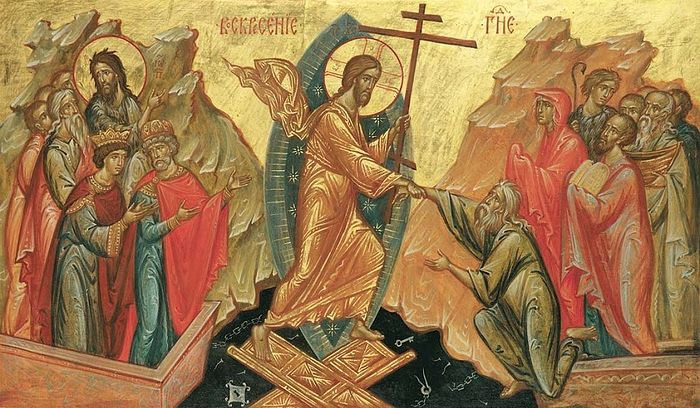
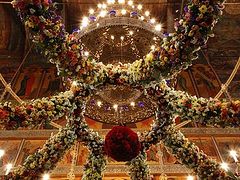
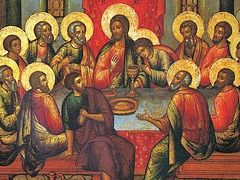
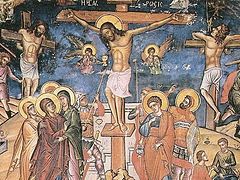
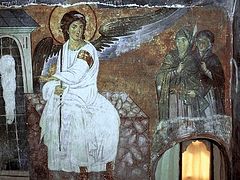
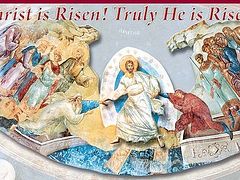
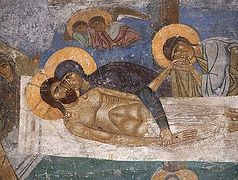
Indeed, how the seer of God (and of our genesis), who did shine of the uncreated Light while still in our sinful flesh, could be held captive in Hades after his death?
His redeeming sacrifice was not yet fulfilled when He teached us that parable....
Also, in his epistle St. Peter talks about the spirits who were held captive, but he does not say that ALL the spirits were captives; contrariwise, he refers to those spirit in prison as being disobedient.... the saints of the Old Covenant were not disobedient.